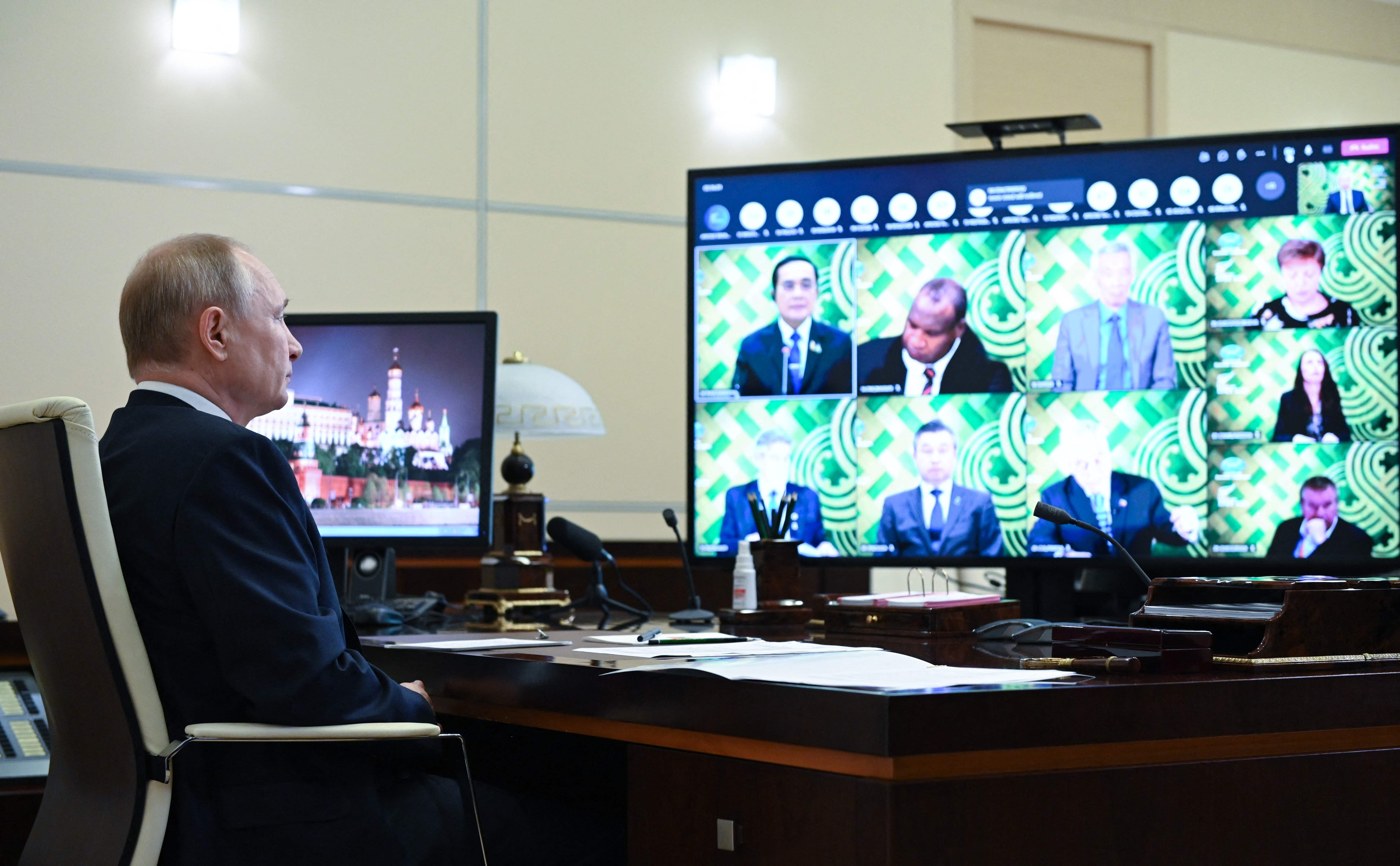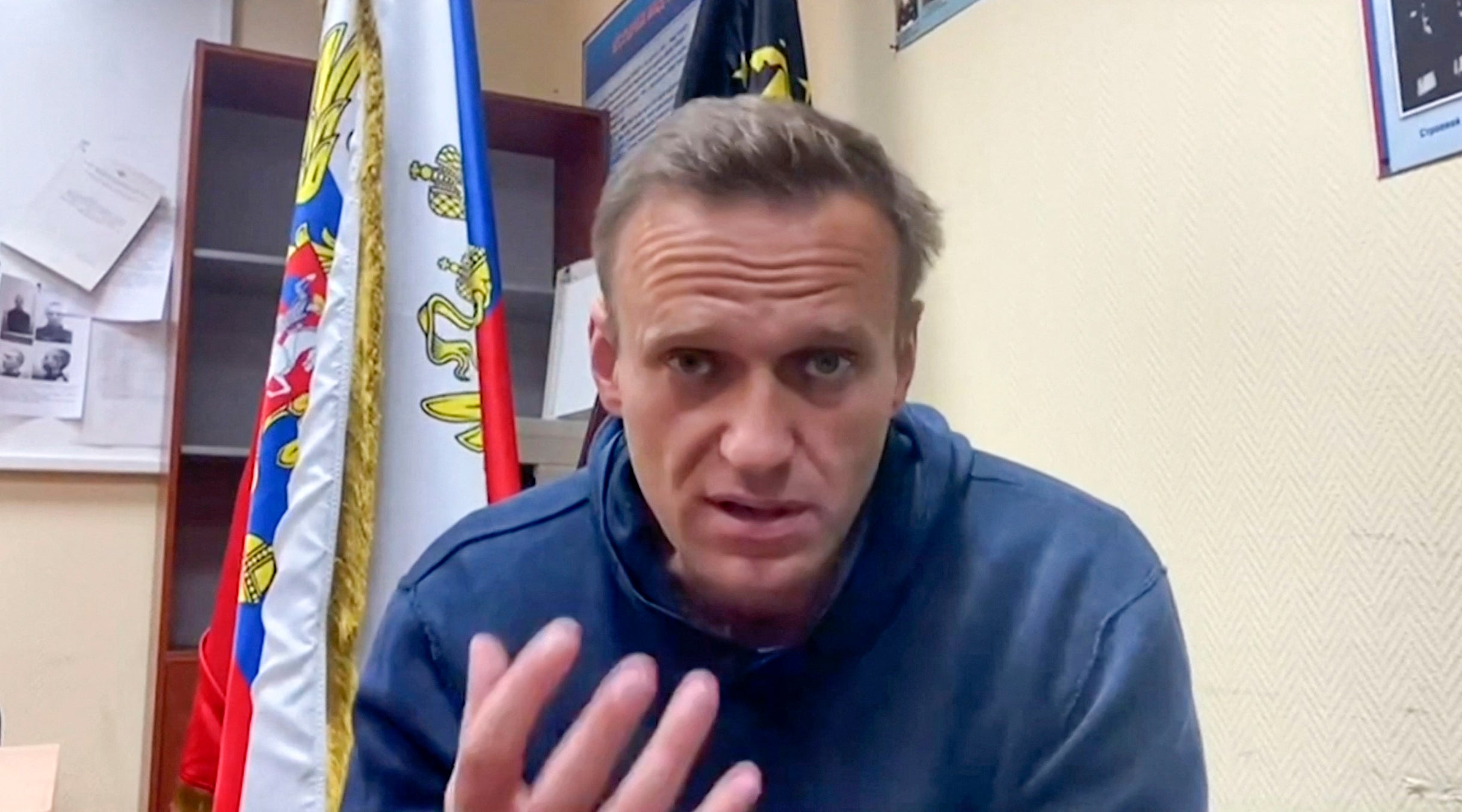Internyet: How the Kremlin is turning on YouTube to quell independent journalism
Global tech companies have created an unlikely market for independent Russian journalism – and a challenge for state propaganda, reports Oliver Carroll in Moscow


The St Petersburg International Economic Forum, Russia’s investment showcase, has long been considered a good barometer of where the country is headed. From a party plaything dominated by oligarchs in the 2000s, it turned – as the Putin era progressed – into the dull shopfront for apparatchiks, state enterprise and propaganda that it is today.
Perhaps the most interesting message of this year’s event was delivered in the form of a flashy exhibition stand for RuTube, the tried-and-failed local alternative to YouTube.
Eyebrows were raised at the notion of a video-sharing dinosaur finding the cash to advertise alongside banks in the main foyer. But loyal Kremlin lieutenants were on hand to join the dots for those who didn’t immediately understand, using speeches to draw unambiguous new battle lines in their fight against global tech.
YouTube had become a risk to Russian security, declared Margarita Simonyan, the pugnacious head of state-funded RT.
“Not defending your digital sovereignty is akin to not defending your borders,” she said. Social media needed to be brought to the heel of national jurisdictions, continued Maria Zakharova, the foreign ministry’s official spokesperson. Alexander Zharov, another state media executive, said Russia desperately needed “trendy and convenient” alternatives to the US video giant.
Not defending your digital sovereignty is akin to not defending your borders
Russians are now one of the world’s most internet-savvy nations. At least 83 per cent of them are regular internet users. Nearly nine out of 10 of that number are at least occasionally tuning into YouTube. Most are looking for food recipes or music videos, but a large proportion are subscribing to Navalny corruption videos and the kind of independent journalism long removed from state television.
That is creating a problem for the Kremlin’s model of media control — and it is desperately trying to fix it.
Journalists and the Kremlin have historically had a close relationship. That is to say, whenever an independent outlet has flourished, the state’s first instinct has been to close it.
The trend to stifle free thought began under Boris Yeltsin, as the Russian leader struggled to control poor ratings with propaganda, but things took a quantitatively different turn under Vladimir Putin.
It has taken time to reach the extreme level of deceit and control where we are today. In the early years, the Kremlin limited its efforts to mass television. Only later did it expand its reach to mass tabloids, then influential newspapers, and then the internet.
The tools were wide-ranging: from gangster methods of appropriation to more subtle pressure through advertisers. But journalists somehow had a way of surviving. Even as their outlets closed, phoenix projects arose from the ashes, using whatever new platform was available.
The reincarnation of Russian journalism on YouTube is partly a continuation of that trend. It is also being driven by a fundamental change in media economics that isn’t unique to Russia. Across the world, audiences and advertisers are turning from television to online video. In Russia, that switch has significant political consequences, with YouTube and independent providers stealing a march on state TV and propaganda.
Alexei Pivovarov and his show Redaktsiya (The Editorial) foregrounded that new journalism. The 47-year-old media veteran’s career has followed many of the same vicissitudes as the industry in general. He was a face of the NTV network for many years, initially making, in his own words, “too many compromises” as the channel bent to a pro-Kremlin line.
Eventually, things became too much and, in 2013, he left mainstream broadcasting. Now, he has a new outlet on YouTube, with a monthly audience of 20 million and a turnover healthy enough to employ 25 people.

Pivovarov argues that the success of his start-up is a direct result of the Kremlin’s clampdown. His product is, in essence, a repackaging of the kind of reportage that might have gone out on terrestrial TV screens 15 years ago, he says – but now, unlike then, it stands alone in a field free of competition. “We are doing things that you don’t see on Russian TV today, and for this reason, we have a major competitive advantage,” he says.
The turning point for Russian YouTube journalism came in 2016-17. That was when the main pioneer of the genre, Yury Dud, showed it was possible to monetise online audiences away from state TV.
It was the spark that spurred Pivovarov to make his move. Many others followed suit, plugging themselves into YouTube’s international money-making possibilities, free of the Kremlin. They include Russia’s only independent TV network, Dozhd (Rain).
In early 2021, with Russia in the middle of protests, Dozhd made a bold decision to switch news broadcasts from behind a paywall back to a free-to-view format on YouTube. The effect was instantaneous, expanding monthly audiences to 25 million and raising the network’s bottom line enough that it was able to launch a new morning show.
All in all, it has been a remarkable turnaround for a channel that had been teetering on the edge of ruin since 2014, when the Kremlin cut it off from cable networks and associated advertising.
Tikhon Dzyadko, the channel’s editor-in-chief, says that he is under no illusions that the state won’t come on the attack again. “The horizontal nature of YouTube and social media has invalidated the previous model of propaganda and manual control, bringing editors to the Kremlin for weekly chats, and so on,” he tells the Independent. “Now, they have to deal with a huge number of bloggers, millions of subscribers, and I’m sure they are tempted just to pull the plug.”
But Dzyadko says he doesn’t think that the authorities are ready to take such a radical step — at least, not yet. Decision-makers in the Kremlin are mindful of YouTube’s popularity, he says, and the dangers of using such a blunt tool. They are also trying to use the platform themselves, not least by tempting some of the most popular YouTubers to work for them.
“We can’t rule anything out, of course, but it doesn’t make any sense to be consumed by fears about what might be,” Dzyadko says. “We continue to work as we always have.”
Officially, the Kremlin says it has no plans to block YouTube, with spokesman Dmitry Peskov even calling the idea “stupid”. Instead, it has couched its plans for foreign tech giants in terms of what it describes as a battle against “criminal content”.
At his annual phone-in show in June, Vladimir Putin accused these networks of distributing child porn and instructions on how to make Molotov cocktails. “We tell them you must remove that,” he says. “They don’t listen to us. This is wrong.”
The problem, however, is that the Kremlin’s definition of “criminal” includes most opposition messaging. It’s a difference of opinion that has fuelled an ongoing public dispute with Twitter, which has a much smaller footprint than YouTube in Russia. On 10 March, the state announced that it was slowing down access to the microblogging app, a measure that remains in place today.
Now, they have to deal with a huge number of bloggers, millions of subscribers, and I’m sure they are tempted just to pull the plug
That intervention is part of an emerging set of weaponry being developed by the Kremlin against global tech. But it is far from the only aspect, with parliament and other pro-Kremlin forces also stepping up legal attacks against independent bloggers. Yekaterina Mizulina, the daughter of uber-conservative and anti-LGBT MP Yelena Mizulina, for example, recently fronted an attempt to prosecute Yury Dud for allegedly promoting drug use in his programmes.
The Lugovoi legislation allows sanctioned citizens to transfer the jurisdiction of any foreign legal claims to pliant courts in Russia. This is how pro-Kremlin oligarch Konstantin Malofeev was able to “win” his legal quarrel with Google, after it blocked his Tsargrad media resource in compliance with US sanctions
The most potent legal instrument to be rolled out so far is a December 2020 law that allows the state to “partially or fully block... resources that violate constitutional rights and freedoms”. Authorities claim that the law has been brought in to defend Russian media from foreign censorship. But, at the very least, it serves a dual purpose, offering the Kremlin a legal way to target YouTube and Facebook.
Google has already found itself prosecuted under the auspices of another new law, drafted by the deputy Andrei Lugovoi, better known for his role in the 2006 assassination of spy Alexander Litvinenko in London.
Google has refused to comply with the sentence, incurring the theoretical prospect of fines equivalent to its entire world market capitalisation.
Until recently, many scoffed at the idea of Russia being able to block a giant like Google even if it wanted to. A previous attempt to block the much less well-known Telegram in 2018 ended in calamity, with the social media app embarrassing censors and bringing down half of the Russian internet in the process.
But Andrei Soldatov, expert and co-author of "The Red Web," a history of surveillance in Russia, says things have changed. Russian bureaucrats are "learning on the job," and now have the technical possibilities to make “serious interventions”.
"The real horror is that they are surprisingly competent — rough and ready, yes, but highly effective," he says. After testing what were described as "sovereign internet" instruments in 2020 and 2021, authorities are now embarked along the road towards Chinese-style internet censorship.
In a first instance, this means providing local, controllable alternatives to the popular global giants. A viable alternative to YouTube, for example, is likely to become a reality as early as next year. RuTube is one of the projects being worked up, but video platforms from Russian IT giants Yandex and Mail.ru, once independent but both increasingly close to the state, are also likely to be in the mix.
Russians are used to YouTube now, says Soldatov, and for some in Moscow the prospect of it being removed is too hard to imagine. But the majority could learn to live on other platforms, he argues. And authorities have already made an important first move by obliging mobile phone manufacturers to include a list of unspecified local apps by default.
Alexei Pivovarov confirms he has already been approached by Russian YouTube competitors with offers to switch his Redaktsiya show to their platforms. For the moment, it isn’t a serious conversation, he insists: they can neither offer the monetisation potential nor audiences of Youtube. But that position could change if the fundamentals change. "I’m no YouTube groupie,” he says.
The media veteran agrees with Soldatov that the Kremlin is likely to pursue stick and carrot — turning the screws on global tech while offering reasonable local alternatives.
"It’s not the first time I’ve been in a situation of outlets being cut off, one by one, before disappearing completely," he says.
"My head tells me history is likely to repeat itself... but that’s not to say the result will be exactly the same."
Join our commenting forum
Join thought-provoking conversations, follow other Independent readers and see their replies
Comments
Bookmark popover
Removed from bookmarks